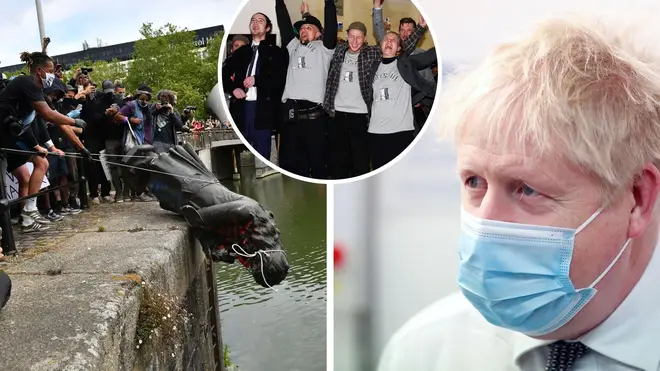
Lewis Goodall 10am - 12pm
6 January 2022, 15:32 | Updated: 6 January 2022, 21:04

Boris Johnson has insisted people can't "go around seeking retrospectively to change our history" like a Wikipedia entry after four people were cleared over toppling the Edward Colston statue.
The Prime Minister declined to comment on the jury's decision to find them not guilty of criminal damage, which delighted activists involved with the demonstration but infuriated others.
The four defendants had declared on Wednesday night that they "rectified history".
Speaking on Thursday, Mr Johnson said: "I don't want to comment on that particular judgment - it's a matter for the court.
"But what I would say is that my feeling is that we have a complex historical legacy all around us, and it reflects our history in all its diversity, for good or ill.
"What you can't do is go around seeking retrospectively to change our history or to bowdlerise it or edit it in retrospect.
"It's like some person trying to edit their Wikipedia entry - it's wrong.
Read more: Colston Four say 'we rectified history' as they're cleared over statue toppling
Read more: 'We can't have mob rule', Grant Shapps tells LBC after Colston Four cleared

Colston 4 cleared of all charges
"And I think if people democratically want to remove a statue or whatever, that's fine. But I think that, in general, we should preserve our cultural, artistic, historical legacy - that's my view."
The so-called "Colston Four" - Rhian Graham, 30, Milo Ponsford, 26, Sage Willoughby, 22, and Jake Skuse, 33 – laughed out of relief when the jury returned a not guilty verdict at Bristol Crown Court.
They had been charged with criminal damage after the 17th and 18th century slave trader's statue was brought down during a Black Lives Matter demonstration in Bristol in June 2020.
Read more: Bristol's slavery 'cancer' was 'surgically removed' by Colston Four, says historian David Olusoga
Read more: Fuming LBC callers go head-to-head in blistering row over 'Colston Four' verdict
Activists then hauled it down about 500 metres to dump it in the harbour.
The act became an iconic scene in the wave of global anti-racism protests sparked by the murder of George Floyd by a white police officer in the US.
But it also sparked a debate about whether it was right for people to take matters into their own hands and rip down public monuments.

Furious Nick Ferrari reacts to the 'Colston four' verdict
Mr Willoughby said outside the court: "They were whitewashing history by calling him a f***ing virtuous man, sorry to swear, we didn't change history, we rectified history."
"They lied, we illuminated history," added Ms Graham.
LBC has broadcast split opinions on the subject.
During LBC's Nick Ferrari at Breakfast, Nick said: "What does it say of law and order?"
"Some people don't like Winston Churchill, they see him as a terrorist or a racist, well if you apply this, and as long as you're doing it for supposedly valid reasons, you're trying to re-write history, you're trying to expose Britain's sordid and tawdry past.
"Let's all go down to Parliament Square, let's paint that statue of Winston Churchill, let's topple it, let's dance on it and drag it down to the Thames and just throw his statue into the river.
"Because all we're doing is putting right a wrong."
Callers aired mixed reactions to the toppling during Nick's show, with one branding it an "absolute disgrace for British justice" while another said it was "fantastic they tore that down" and questioned why a statue was put up to "celebrate" Colston.
Transport secretary Grant Shapps told Nick "we can't have mob rule as the way forward" while Professor David Olusoga, a witness for the "Colston Four", told James O'Brien: "This court case has recognised that there was another injury here being caused, to real people and their real emotions, rather than to a hunk of bronze and marble."